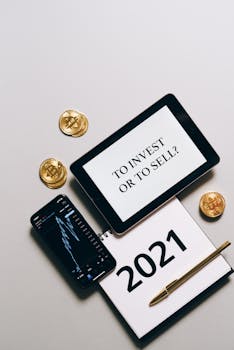Anúncios
If you’ve ever wondered why some people seem calm about money no matter what, there’s a mindset behind it. Developing a financially independent mindset doesn’t happen overnight, but every shift pays off over time.
This topic matters because more Americans are seeking financial security and clarity. Real progress depends less on how much you earn and more on how you think, plan, and act around money.
Read on for practical insights into the financially independent mindset that top investors use daily. You’ll learn how ordinary actions, not luck, create sustained confidence and real wealth.
Identifying the Core Beliefs of Independent Investors
To build lasting financial security, start by adopting certain beliefs. These beliefs drive daily behaviors, influencing every savings deposit and investment decision you make.
People with a financially independent mindset view money as a tool, not a goal. This shapes their confidence in saving, investing, and patiently building wealth over years.
Expecting Uncertainty Is Normal for Financially Independent People
Financially independent people expect unexpected expenses and market swings. They use phrases like, “I plan for surprises.” Their nonchalant body language during volatility reflects preparation.
Instead of fearing market dips, they say, “That’s just part of the process. Wealth grows in cycles.” They check investments calmly every quarter, not daily, showing disciplined detachment.
They adopt a financially independent mindset by consistently saving a set percentage of their income. This discipline provides control even when life delivers surprises.
Seeing Every Dollar as an Employee Working for You
Imagine each dollar you invest as an employee with a job. People committed to a financially independent mindset direct these dollars toward growth opportunities, not mindless spending.
For instance, when tempted to splurge, they’ll pause and ask, “Would I rather this dollar work for me or provide a fleeting thrill?” This habit gradually redirects more money toward investments.
Using such personification helps people separate short-term wants from powerful, long-term choices—turning small steps into an unstoppable financial routine.
| Belief | Observable Behavior | Common Statement | What to Do Next |
|---|---|---|---|
| Money is a tool | Review budgets monthly | “This helps my future.” | Schedule 30 minutes for a money review |
| Plan for uncertainty | Maintain emergency fund | “Surprise bills don’t stress me.” | Transfer a set amount to savings now |
| Invest consistently | Automate contributions | “Growth is automatic for me.” | Set up auto-transfers from checking |
| Prioritize education | Read financial articles weekly | “I’ll learn before I leap.” | Bookmark reliable finance sites |
| Delay gratification | Pause before big purchases | “I’ll wait one week, then decide.” | Practice the 7-day rule for nonessential buys |
Building Habits That Reinforce Financial Independence
Sustaining a financially independent mindset requires routine habits that keep you on track. Each habit reinforces your progress and prevents costly setbacks, even during stressful times.
Begin by making one adjustment at a time so the new habit becomes a regular part of your day. Stack these actions for stronger, automatic results.
Review Finances Weekly to Stay Ahead
Scheduled weekly check-ins help anchor a financially independent mindset. Take time on Sunday or Monday to review spending and savings. Track what worked and what needs adjusting.
Each review builds discipline and places you in control of your money. You’ll catch mistakes faster and spot trends before they cause damage, like recurring overspending in a forgotten category.
- List every transaction you made this week to increase your awareness and curb hidden patterns.
- Cancel or pause at least one unused subscription to reclaim money that can be redirected toward savings or investing.
- Move leftover funds immediately from checking to savings to eliminate the temptation to spend on impulse items.
- Write down a specific financial win, even if it’s small, to build positive momentum for your financially independent mindset.
- Update your progress on financial goals — seeing gradual improvement improves motivation for the coming week.
Regular reviews build unshakable confidence over time, making financial independence feel within reach.
Automate Good Decisions for Consistency
Treat your savings and investment moves like paying a recurring bill. Automation removes friction, letting your financially independent mindset develop in the background while you focus on other tasks.
Set up auto-transfers the day after each paycheck, directing money to a separate savings or investment account. Over time, you’ll barely notice the transfer, but you’ll notice the results.
- Automate retirement account contributions so you invest regardless of how your month unfolds, ensuring steady growth.
- Enable automatic deposits for high-yield savings, letting your emergency fund grow without manual effort or stress.
- Set alerts on bill due dates to avoid missed payments and maintain excellent credit with minimal anxiety or wasted fees.
- Schedule quarterly reviews for your portfolio, using digital reminders so you never fall behind on portfolio rebalancing tasks.
- Update your beneficiary designations annually, ensuring all accounts match your long-term financial priorities and wishes.
Smart automation combines with mindfulness for a system that supports real independence, even when life becomes hectic.
Confronting Emotional Biases in Investing Decisions
Learning to spot and interrupt emotional biases makes your financially independent mindset much stronger. Doing so reduces panic-driven decisions and steadies your long-term path.
Recognizing Fear-based Responses When Markets Dip
Panic selling is common, but resilient investors use statements like, “My strategy accounts for downturns” to refocus. Checking accounts less frequently and sticking to a written plan can interrupt fear before it damages your portfolio.
When headlines spike anxiety, take one slow breath and review your strategy. Say aloud, “I’ve invested for the long term.” Hands off your sell button until the next planned review.
Write intentions down in advance. If tempted to deviate, read them out loud: “Stay invested; ignore the noise.” This script reinforces a financially independent mindset every time uncertainty strikes.
Interrupting Greed-driven Behavior by Setting Rules
Chasing hot stocks or speculative gains leads to poor outcomes. Experienced investors use rules, such as “No buying in a surge.” This discipline protects your long-term results when everyone else gets carried away by hype.
Review your portfolio quarterly, not daily. Adjust with a cool head, guided by a checklist, like: “Is this within my strategy? Does it fit my risk level?”
Share your investment plans with a trusted friend or advisor. This accountability prevents emotional overreactions and supports a practical, financially independent mindset for decades.
Exploring Delayed Gratification for Continuous Growth
Practicing delayed gratification expands your control over money. Each time you wait before spending, you reinforce your financially independent mindset and strengthen your long-term confidence.
Rather than denying yourself every whim, create a pause when tempted. The “wait 7 days” rule gives breathing space, making conscious spending feel easier and less stressful.
Turning Temptation into Growth Opportunities
When you resist an instant purchase for a week, you’ll often lose interest. Taking that saved amount and investing it instead builds your portfolio, not your closet. Write down what you saved each time.
Analogies help: Treating your money like planting seeds, you don’t expect fruit after one day. Patience allows your ‘financial tree’ to flourish over time, bearing fruit long after you stop noticing each deposit.
Carefully waiting before spending, and reinvesting saved dollars, forms lasting behaviors that power the financially independent mindset day after day.
Turning Small Sacrifices into Investment Wins
Swap out daily coffee runs for homemade drinks. Every $4 spared, invested at modest returns, may grow into thousands in a decade. This reframing motivates consistent, smart decisions over compulsive purchases.
Use mini scripts: “If I spend, it’s gone forever. If I invest, it could multiply.” Apply this phrase before every purchase, training your financial ‘reflexes’ with time.
Write these little victories on your phone or calendar. Seeing frequent wins cements your financially independent mindset, constantly encouraging further improvement without harsh self-denial.
Adopting Resilient Action Steps for Tough Markets
With so much uncertainty, resilient actions matter most for growing wealth. Applying proven steps lets your financially independent mindset turn setbacks into opportunities for future gain.
Break every problem into small, manageable steps. Like organizing a cluttered room, clearing one corner at a time creates momentum and encourages progress.
Scripting Your Response to Downturns (and Sticking With It)
Write down a single, repeatable script: “Market drops are chances to buy at a discount.” Review this script before checking account balances during rough weeks for extra conviction.
Keep a small shopping list of quality investments you’d consider if prices fall. Watching them become cheaper turns worry into purposeful excitement rather than panic or regret.
Use this script and list to guide any investment adjustments, keeping your reactions steady regardless of outside noise or anxious headlines.
Checking Assumptions Before Major Moves
When uncertainty hits, check your logic: “If I act now, am I following my long-term plan?” Review written goals before selling or buying unexpectedly.
Call a friend or partner, share your plan out loud, and invite feedback. Explaining your thinking with words, not just thoughts, helps you catch flawed reasoning or fear-based errors.
This shared communication habit reflects the same steady confidence seen in every financially independent mindset.
Leveraging Consistent Education for Lasting Financial Confidence
Learning isn’t a one-time task but a continuous process that builds your finance skills. Prioritizing education nurtures a financially independent mindset and prepares you for any situation.
Set reminders for ongoing learning, such as reading one reliable article or listening to one finance podcast per week. Knowledge snowballs, strengthening your ability to handle money with skill.
Choosing the Best Sources for Real-World Application
Pick three trusted resources—like a specific book, blog, or advisor—and consult them for every major move. Ignore unverified tips or headlines that focus purely on hype.
Say, “I’ll learn before I leap.” Pause any decision for at least one day while double-checking your sources. This habit strengthens every layer of your financially independent mindset while reducing costly errors.
Document new skills or facts that work in your own life, turning knowledge into tested routines and practical gains.
Translating Education Into Immediate Action
Knowledge alone doesn’t transform your finances—action does. Implement new ideas immediately, even on a small scale, to maintain momentum and build confidence rooted in experience, not theory alone.
Start a watch-list of investment ideas, or trial a budgeting technique for one month. Track your results to see improvement clearly, reinforcing your financially independent mindset every step.
Repeat and scale what works. Small actions add up to lifelong habits, giving you more control and less stress around every financial decision.
Reviewing Key Traits for the Financially Independent Mindset
The financially independent mindset blends core beliefs, learned skills, resilience, and daily habits. Together, these ingredients build a foundation for freedom—one you can start strengthening now, no matter your income.
Consistent self-review and improvement keep you grounded. Even during setbacks, returning to these principles helps maintain calm, optimize choices, and accelerate growth, regardless of market conditions or economic uncertainty.
The traits of this mindset can be summarized:
- Accept financial setbacks as learning opportunities, using mini-scripts to refocus and grow from each situation
- Make decisions automatic where possible, removing friction and freeing up mental space for higher-value actions
- Pause before large purchases, applying the “wait 7 days” rule to redirect money into investments for lasting benefit
- Invest in personal financial literacy weekly, adapting new techniques or knowledge into your routine for compounding gains
- Share your goals and strategies with someone you trust, staying accountable and inviting valuable feedback when needed
Embrace the mindset, practice these actions, and you’ll find yourself moving steadily from financial dependence to lasting independence with each choice.
Try just one new habit or reframe your next financial decision with the above tools, and watch your confidence—and your investments—grow in real time.



